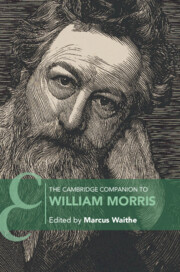Book contents
- The Cambridge Companion to William Morris
- The Cambridge Companion to William Morris
- Copyright page
- Dedication
- Contents
- Figures
- Notes on Contributors
- Acknowledgements
- Note on The Collected Works
- Chronology
- Abbreviations
- Introduction
- Part I Senses of Place
- Part II Authorship
- Part III The Practical Arts
- Part IV Movements and Causes
- Part V Influences and Legacies
- Chapter 19 Morris and John Ruskin
- Chapter 20 Morris and Marxism
- Chapter 21 William Morris’s ‘Medieval Modern’ Afterlives
- Chapter 22 Morris in the Twenty-First Century
- Guide to Further Reading
- Index
- Cambridge Companions To …
Chapter 20 - Morris and Marxism
from Part V - Influences and Legacies
Published online by Cambridge University Press: 03 May 2024
- The Cambridge Companion to William Morris
- The Cambridge Companion to William Morris
- Copyright page
- Dedication
- Contents
- Figures
- Notes on Contributors
- Acknowledgements
- Note on The Collected Works
- Chronology
- Abbreviations
- Introduction
- Part I Senses of Place
- Part II Authorship
- Part III The Practical Arts
- Part IV Movements and Causes
- Part V Influences and Legacies
- Chapter 19 Morris and John Ruskin
- Chapter 20 Morris and Marxism
- Chapter 21 William Morris’s ‘Medieval Modern’ Afterlives
- Chapter 22 Morris in the Twenty-First Century
- Guide to Further Reading
- Index
- Cambridge Companions To …
Summary
This article unpicks William Morris’s relationship to Marxism and the influence of Marxism on Morris’s social and political thought. It looks at Morris’s political activities in the 1880s and 1890s, including his membership of the Social Democratic Federation, the Socialist League and the Hammersmith Socialist Society, as well as his political speeches and journalism. Morris was clearly a socialist and described himself as a communist, had read and was influenced by Marx, and was also an active participant in socialist and Marxist debates both in Britain and Europe. But Marxism did not harden into an orthodoxy until the 1890s and has been contested ever since. It is thus very difficult to distinguish Marxist from other socialists in the period of Morris’s political engagement, as many themes were either shared or cut across this distinction. A key issue has been Morris’s utopianism, in particular News from Nowhere, written for the socialist paper Commonweal in 1890. Morris’s utopian method permeates his political essays: this is how it is, this is how it could/should be. This, perhaps, renders Morris more than Marxist, rather than less, in his insistence on keeping the vision of a better world active as an inspiration to political change.
- Type
- Chapter
- Information
- The Cambridge Companion to William Morris , pp. 271 - 282Publisher: Cambridge University PressPrint publication year: 2024

